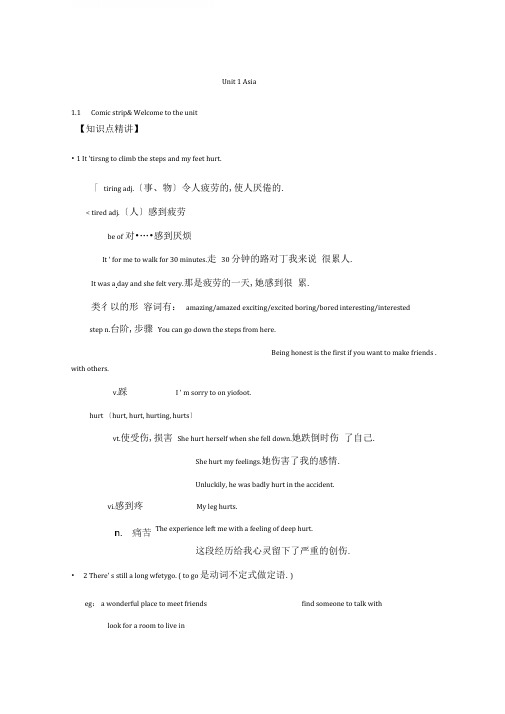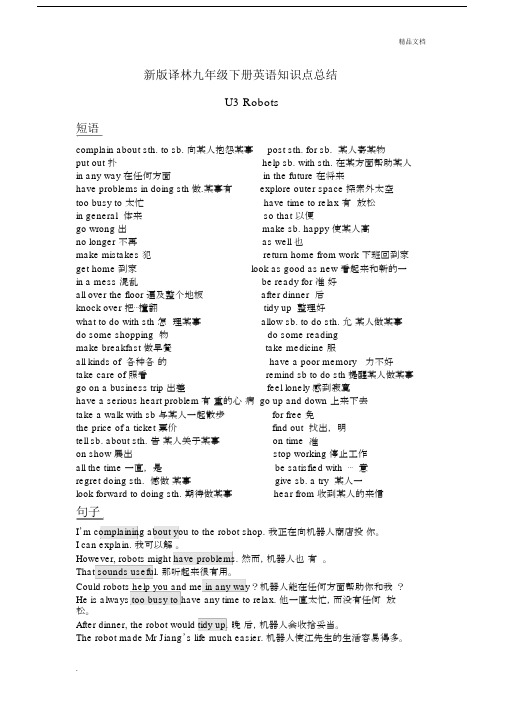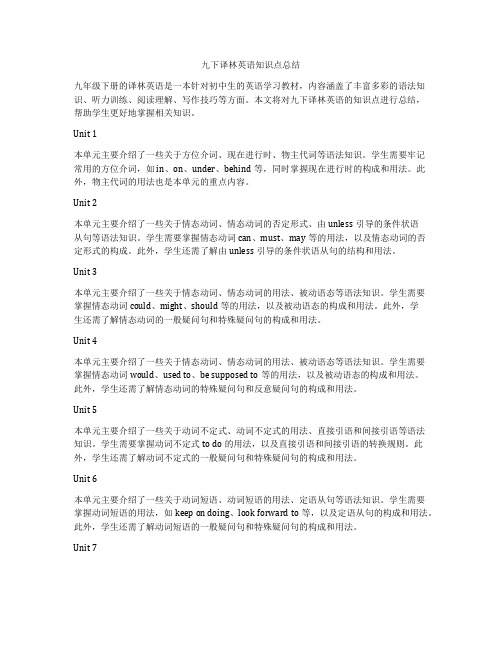新版译林九年级下册英语知识点总结
译林九年级英语下册知识点

译林九年级英语下册知识点一、语法知识点1. 一般现在时一般现在时表示经常性或习惯性的动作、状态或真理。
例句:- I often go for a walk in the park.我经常在公园散步。
- The sun rises in the east.太阳从东方升起。
2. 一般过去时一般过去时表示过去发生的动作或情况。
例句:- She lived in London for two years.她在伦敦住了两年。
- They went to the beach last summer.他们去年夏天去了海滩。
3. 现在进行时现在进行时表示现在正在进行的动作。
例句:- We are watching a movie right now.我们正在看电影。
- He is studying for the exam at the moment.他此刻正在为考试而学习。
4. 一般将来时一般将来时表示将来要发生的动作或存在的情况。
例句:- We will visit our grandparents next weekend.我们下周末会去看望祖父母。
- She is going to travel to Japan next month.她下个月将要去日本旅行。
5. 定语从句定语从句用来修饰一个名词,并且在句中担当定语的作用。
例句:- The book that I am reading is very interesting.我正在读的那本书非常有趣。
- The girl who won the competition is my friend.赢得比赛的那个女孩是我的朋友。
二、词汇知识点1. 动词短语固定动词短语是英语中常用的固定搭配,掌握这些短语可以丰富表达方式。
例句:- give up (放弃)She didn't give up easily and finally achieved her goal.她没有轻易放弃,最终实现了她的目标。
牛津译林版九下Unit1知识点总结梳理

Unit 1 Asia1.1Comic strip& Welcome to the unit【知识点精讲】• 1 It 'tirsng to climb the steps and my feet hurt.「tiring adj.〔事、物〕令人疲劳的,使人厌倦的.< tired adj.〔人〕感到疲劳be of对•…•感到厌烦It ' for me to walk for 30 minutes.走30 分钟的路对丁我来说很累人.It was a day and she felt very.那是疲劳的一天,她感到很累.类彳以的形容词有:amazing/amazed exciting/excited boring/bored interesting/interestedstep n.台阶,步骤You can go down the steps from here.Being honest is the first if you want to make friends . with others.v.踩I ' m sorry to on yiofoot.hurt 〔hurt, hurt, hurting, hurts〕vt.使受伤,损害She hurt herself when she fell down.她跌倒时伤了自己.She hurt my feelings.她伤害了我的感情.Unluckily, he was badly hurt in the accident.vi.感到疼My leg hurts.The experience left me with a feeling of deep hurt.这段经历给我心灵留下了严重的创伤.• 2 There' s still a long wfetygo. ( to go 是动词不定式做定语.)eg: a wonderful place to meet friends find someone to talk with look for a room to live in1)He is always the first person(come) and the last one (leave ).2)There are many interesting books( choose ) from, but I don ' t know which to borrow.3)There is nothing(worry )about.• 3 We had better keep moving.①had better do sth.表示“最好做某事〞,表示劝告、建议或者愿望,否认形式是在had better后面加上not.例如:You' d better have a rest.You' d better not miss the last bus.②keep (on) doing sth意为“继续做某事、重复做某事〞.They kept talking about it.• 4 J go on to do 一事做完,接着做另一件事go on doing 事情暂停后继续做;一直做某事go on with后接名词或代词1)After a short break ,he went on(read) the rest of the text.2)After reading the novel , he went on(write) an article.• 5 wake v. (woke, waken, waking, wakes) adj. awakewake up your sister wake (me/him/her/them/you …)up• 6 Tian ' anmen Square, the Palace Museum and the Great Wall are wonderful places to go.to go这里是动词不定式作后置定语,修饰wonderful places.不定式作后置定语时,不定式与所修饰的名词之间往往有动宾关系, 如果不定式是不及物动词,动词不定式后面要加上必要的介词.We want some water to drink.He is a pleasant fellow to work with.1.2Reading【知识点精讲】• 1 In the middle of the ancient city of Beijing is the Palace Museum, also called the Forbidden City.①in the middle of表示“在...... 中间〞.What can you see in the middle of the picture?The teacher is standing in the middle of us.②called此处为动词的过去分词作定语,意为“被称为、被叫作〞,与named同义.例如:This is a book named/calledJourney to the WestThe Greens have a daughter named/called Kate.•2The emperors of the Ming and Qing dynasties used to live there.used to do sth.过去常常做某事〞,暗含现在不再〞之意,后接动词原形,疑问形式可以直接将used 提到句首,或者借助助动词did;否认式可以直接在used后面加not,或者用didn't【辨析】be /get used to doing sth., used to do sth.与be used to do sth.be /get used to doing sth. 习惯丁做某His father is used to watching TV before going to bed.事The boy used to play computer games.used to do sth. 过去经常做杲事More and more wood is used to make paperbe used to do sth.被用来做某事• 3 With wonderful buildings and art treasures inside , it is well worth a visit.①with复合结构" with+宾语+宾语补足语〞在句中作状语,表示伴随、原因、时间、条件、方式等.作宾语补足语的可以是形容词、名词、副词、介词短语、现在分词、过去分词或者动词不定式.He stood before his teacher with his head down.She said goodbye with tears in her eyes.He fell asleep with the lamp burning.I can ' t go out with all these clothes to wash.②be worth后常接名词或者动名词,表示“值...... 〞.The new car is worth at least 1 million.The novel is worth reading once more.• 4 Many tourists like to gather there early in the morning to watch the raising of the national flag.:rise raiserise 不及物动词上升〞The water in the river rose after the heavy rain. The sun rises in the east and sets in the west.rais e 及物动词E提升, 筹集,才口同, 举起〞The worker want the boss to raise their wages.The teacher asks us to raise our hands if we have questions.We should try our best to raise more money for the poor family.• 5 It is one of the wonders of the world.wonder作名词,意为“奇迹〞,常用的句型有:①It ' s a wonder that.为“奇怪的是 ........ 〞It ' s a wonder that she is still alive.②It 'no wonder that..点为“难怪 ....... 〞.It ' s no wonder that they won ' t come.【拓展】wonder用作及物动词,意为“想知道,对...... 好奇〞,常见的用法有:①后接who, what, why, where, when, how, which引导的宾语从句.She wondered what the child was doing.②后接if和whether引导的宾语从句.She wondered whether you were free that morning.③后接“疑问词+不定式〞构成的短语.I ' m just wondering how to do it.• 6 It lies on the two sides of the Lijiang River.动词lie表示“躺、位丁、撒谎〞lie 〔躺、位丁〕一lay 〔过去式〕一lain 〔过去分词〕-lying 〔现在分词〕lie 〔撒谎〕一lied 〔过去式〕一lied 〔过去分词〕-lying 〔现在分词〕lay 〔放置、下蛋〕一laid 〔过去式〕一laid 〔过去分词〕-laying 〔现在分词〕•7 ..some hang down, and others point upwards.①hang意为“悬:挂〞,过去式和过去分词都是hung, hang表示“上吊〞时,过去式和过去分词是hangedThis picture is hung on the wall.The man was hanged for murder.②point作动词,意为“指、指向〞常用的短语有point out"指出、指明〞;point to意为“指向〞,强调方向;point at表示指着某一个物体,指人时一般表示粗鲁或者不礼貌.He pointed to the door and there I saw a girl smiling at me.The teacher pointed at the map and told where Britain was.1.3Grammar【知识点精讲】• 1 The lake is very big -it takes up three quarters of the area.①take up意为“占据空间、占用时间〞.He has taken up a position in the centre of the room.I know how busy you must be and I wouldn ' t want to take up too much of your time.②quarter作名词,意为“四分之一〞.Three quarters of the students are boys.• 2 There are many tone lions on either side of it.either表示两者中的任何一个〞,做主语时,谓语动词常用单数形式,起其后可接of短语.You can come on Saturday or Sunday. Either is OK for me.We can't care much for what to eat. Either of the two will do.neither表示两者都不〞,做主语时,谓语动词常用单数形式,其后可接of短语. We have red and yellow Tshirts. Which color do you like?Oh, neither. I think blue will be OK.Neither of them wants to speak to him about this matter.• 3 They provide a high level of services .service作名词,意为“效劳〞,动词形式为serv&We all complain about the poor services of the hotel.Children must be educated to serve their country when they grow up.【语法精讲】代词it的用法1.it作人称代词的用法(1)指事物.it可指代除人以外的一切事物或动物.例如:—Where is the cat猫在哪?—It' s in the bedroom 它在卧室里.(2)指人.it可用丁指代性别不明的婴儿或用丁确认某人的身份.例如:Is it a boy or a girl?是男孩还是女孩?There is a knock on the door.It must be the postma^t人在敲门.一定是邮递员.(3)代替某些代词.it还可用丁代替指示代词this,that以及复合不定代词something,anything,nothing等.例如: —What' s this?®是什么?—It' s a present for you这是给你的礼物.2.it作非人称代词的用法.it主要用丁指代时间、距离、价值、天气、气候及温度等自然现象.例如:It' s 7 o' clock now.现在7 点钟.—How far is it from here to the station於里离车站多远?—It' s about two kilometres 大约两千米.3.it作形式主语或形式宾语的用法.(1)it作形式主语.当不定式、动名词、从句等成分作句子主语时,通常把真正的主语放在句末, 而在句首用it作形式主语.①It+be+adj.+for/of sb+to do sth 意为某人做某事......... 〞.例如:It is hard for him to make up his mind.他彳艮难下定决兀、.②It takes/took sb+寸问段+to do sth意为某人做某事花了多长时间〞.例如:It took me a month to get rid of my smoking 我花了一个月时间才把烟戒掉.③It is said/reported that..意为据说/据报道....... 〞.例如:It is said that he will study abroad 据说他要出国学习.(2)it作形式宾语.当不定式、动名词、从句等复杂成分作宾语,且其后跟有宾语补足语时,通常会在宾语补足语前用it作形式宾语,而将真正的宾语移至句末.其结构为生语+ 谓语+it+宾语补足语+不定式/动名词/从句〞.例如:I find it difficult to do the job well.我发现做好这项工作不容易.1.4Integrated skills &Study skills【知识点精讲】• 1 leaveJapan for another Asian country①Japan名词,意为“日本〞,其形容词形式Japanese意为“日本的〞,Japanese 还可表示“日本人〞,其复数形式和单数形式相同,为Japanese.He is from Japan.他来自日本.Here are some Japanese^ 儿是一些日本人.【拓展】其他一些单复数同形的单词:sheep?帛羊〕,deer 〔鹿〕,Chinese (中国人)• 2 looking down【拓展】含look的短语look down 俯视look after 照顾look at 看.....look back 回忆look for 寻找look forward to 盼望look into 调查look like看起来像look over 检查look in the eyes 注视look away转移目光How high the building is! I can' tLi Yan is such a helpful girl that she always my little sister while I ' maway.1.5Task&Self-assessment【知识点精讲】• 1 over one billion, the second largest population in the world.population表示“人口〞,是集合名词,对人口数量提问时,用what而不用how many/much, population 假设作主语,强调整体概念时,谓语用单数形式,强调个体时,谓语用复数形式.What' s the population in China now?The population of this small town is three thousand.More than one fifth of the population of the country are over 60 years old.【拓展】1〕population常与定冠词the连用,作主语用时,谓语动词常用第三人称单数形式.The world's population increasing faster and faster.世界的人口增长得越来越快.At the beginning of the twentieth ce ntury, the world's population was about 1,7 billion.在二十世纪初,全世界的人口大约是十七亿.2〕当主语是表示〞人口的白分之几、几分之几"时,谓语动词用复数形式.About seventy percent of the population in China farmers.中国大约有白分之七十的人口是农民.3〕有时population可用作可数名词,其前可用不定冠词.China has a population of about 1.3 billion.(=There is a population of about 1.3 billion in China.)中国大约有十三亿人口.New York is a big city with a population of over 10 million.纽约是一个有一千多万人口的大城市.4)表示人口的"多"或"少",不用"much"或"little",而要用"large"或"small".India has a large population.印度人口众多.Singapore has a small population.新加坡人口少.5)询问某国、某地有多少人口时,不用"How much...?〞,而用〞How large...?";在问具体人口时用〞What...?〞.-How is the population of your hometown?你们家乡有多少人口?-The population of our hometown is nearly twice as large as that of yours.我们家乡的人口是你们家乡人口的将近两倍.-is the population of Canada?加拿大的人口有多少?-The population of Canada is about 29 million.加拿大的人口大约有二千九K万.• 2 famous for IT(information technology) industry.be famous for sth. “因 ...... 而知名〞The writer is famous for his novels.be famous as “作为..... 而知名〞The man is famous as a novelist.。
新版本译林初中九年级的下册的英语学习知识点总结计划.docx

新版译林九年级下册英语知识点总结U3 Robots短语complain about sth. to sb. 向某人抱怨某事post sth. for sb. 某人寄某物put out 扑help sb. with sth. 在某方面帮助某人in any way 在任何方面in the future 在将来have problems in doing sth做.某事有explore outer space 探索外太空too busy to 太忙have time to relax 有放松in general 体来so that 以便go wrong 出make sb. happy 使某人高no longer 不再as well 也make mistakes 犯return home from work 下班回到家get home 到家look as good as new 看起来和新的一in a mess 混乱be ready for 准好all over the floor 遍及整个地板after dinner 后knock over 把⋯撞翻tidy up 整理好what to do with sth 怎理某事allow sb. to do sth. 允某人做某事do some shopping 物do some readingmake breakfast 做早餐take medicine 服all kinds of 各种各的have a poor memory 力不好take care of 照看remind sb to do sth 提醒某人做某事go on a business trip 出差feel lonely 感到寂寞have a serious heart problem有重的心病 go up and down 上来下去take a walk with sb 与某人一起散步for free 免the price of a ticket 票价find out找出,明tell sb. about sth. 告某人关于某事on time准on show 展出stop working 停止工作all the time 一直,是be satisfied with ⋯ 意regret doing sth. 憾做某事give sb. a try 某人一look forward to doing sth. 期待做某事hear from 收到某人的来信句子I’m complaining about you to the robot shop. 我正在向机器人商店投你。
九年级全册英语译林版重难知识点

九年级全册英语译林版重难知识点英语作为一门重要的国际语言,在我们的学习中起着关键的作用。
在初中九年级的英语学习中,译林版是常用的教材之一。
本文将介绍九年级全册英语译林版中的一些重难知识点,希望对同学们的学习有所帮助。
一、时态和语态时态是英语语法中非常重要的一部分。
译林版九年级英语教材中涉及到的时态有一般现在时、一般过去时、一般将来时等。
同学们需要熟练掌握这些时态的构成和用法,并能够在实际运用中准确地选择适当的时态。
语态是指动词形式中表明动作主语与动作对象的关系。
在译林版九年级英语教材中,常用到的语态有被动语态。
同学们需要了解被动语态的构成,掌握其在句子中的用法,并能够正确地转换主动语态和被动语态。
二、介词和连词介词和连词在英语中起到连接词组和句子的作用。
在译林版九年级英语教材中,同学们需要掌握一些常用的介词和连词,并能够在句子中正确使用。
常用的介词如in、on、at、by等,它们通常用来表达时间、地点、原因、方式等概念。
同学们需要根据具体的语境选择适当的介词。
常用的连词如but、and、or等,它们通常用来连接并列或对比的词组、短语或句子。
同学们需要注意连词的使用位置和连接的对象,避免出现语法错误。
三、词汇和短语词汇和短语是学习英语的基础,也是提高语言水平的关键。
在译林版九年级英语教材中,同学们需要掌握一些重要的词汇和短语。
同学们需要积累常见的动词、形容词、副词等,并能够灵活运用于句子中。
同时,需要掌握一些常用的短语,如keep up with、get along with、look forward to等,这些短语在口语和写作中经常出现。
四、语法点除了时态、语态等基本语法外,译林版九年级英语教材还涉及一些复杂的语法点,如虚拟语气、宾语从句、定语从句等。
同学们需要理解这些语法点的构成和用法,并能够正确地应用于实际语境中。
虚拟语气是英语中一个比较难点的语法,它通常用来表达不可能实现、假设或建议等概念。
九下译林英语知识点总结

九下译林英语知识点总结九年级下册的译林英语是一本针对初中生的英语学习教材,内容涵盖了丰富多彩的语法知识、听力训练、阅读理解、写作技巧等方面。
本文将对九下译林英语的知识点进行总结,帮助学生更好地掌握相关知识。
Unit 1本单元主要介绍了一些关于方位介词、现在进行时、物主代词等语法知识。
学生需要牢记常用的方位介词,如 in、on、under、behind等,同时掌握现在进行时的构成和用法。
此外,物主代词的用法也是本单元的重点内容。
Unit 2本单元主要介绍了一些关于情态动词、情态动词的否定形式、由unless引导的条件状语从句等语法知识。
学生需要掌握情态动词can、must、may等的用法,以及情态动词的否定形式的构成。
此外,学生还需了解由unless引导的条件状语从句的结构和用法。
Unit 3本单元主要介绍了一些关于情态动词、情态动词的用法、被动语态等语法知识。
学生需要掌握情态动词could、might、should等的用法,以及被动语态的构成和用法。
此外,学生还需了解情态动词的一般疑问句和特殊疑问句的构成和用法。
Unit 4本单元主要介绍了一些关于情态动词、情态动词的用法、被动语态等语法知识。
学生需要掌握情态动词would、used to、be supposed to等的用法,以及被动语态的构成和用法。
此外,学生还需了解情态动词的特殊疑问句和反意疑问句的构成和用法。
Unit 5本单元主要介绍了一些关于动词不定式、动词不定式的用法、直接引语和间接引语等语法知识。
学生需要掌握动词不定式to do的用法,以及直接引语和间接引语的转换规则。
此外,学生还需了解动词不定式的一般疑问句和特殊疑问句的构成和用法。
Unit 6本单元主要介绍了一些关于动词短语、动词短语的用法、定语从句等语法知识。
学生需要掌握动词短语的用法,如keep on doing、look forward to等,以及定语从句的构成和用法。
此外,学生还需了解动词短语的一般疑问句和特殊疑问句的构成和用法。
译林版九年级下册知识点

译林版九年级下册知识点一、名词名词是表示人、事物、动物、地点等的名称的词语。
它可以单独作为一个词语出现,也可以作为句子的主语、宾语、定语、补语等成分。
1. 专有名词:表示特定人、事物或地点的名称,如中国、李明、北京等。
2. 普通名词:表示一类事物的名称,如桌子、汽车、学校等。
3. 集合名词:表示一类事物的群体或集合的名称,如队伍、家具、群众等。
4. 抽象名词:表示抽象概念、性质、状态等的名称,如喜悦、友谊、胜利等。
5. 物质名词:表示没有固定形状、能被感官感觉到的物质的名称,如水、空气、石头等。
二、代词代词是用来代替名词的词语,可以在句子中充当名词的作用,起到指代或代替的作用。
1. 人称代词:表示说话人、被说话人或与说话人和被说话人有关系的人的词语,如我、你、他等。
2. 物主代词:表示表示所有关系的词语,如我的、你的、他的等。
3. 指示代词:表示指示、指代某人或某物的词语,如这、那、这些、那些等。
4. 疑问代词:表示疑问的词语,用来提问,如谁、什么、哪个等。
5. 不定代词:表示不确定或泛指的词语,如一些、许多、任何、某个等。
三、动词动词是表示动作、变化或状态的词语。
在句子中常作谓语,用来表达主语的动作、状态或是对主语的陈述、判断等。
1. 实义动词:表示具体动作、行为或存在的词语,如跑、吃、学习等。
2. 系动词:表示状态、性质、特点等的词语,如是、变得、看起来等。
3. 助动词:用来构成某些时态和语态的动词,如be动词、do 动词等。
四、形容词形容词是表示事物的性质、特征、状态等的词语。
它可以修饰名词或代词,表示名词或代词的性质、特征等。
1. 基本形容词:表示事物的性质、特征等,如好、美、高等。
2. 比较级形容词:表示两者相比较的程度或大小的形容词,一般用于比较级句型中,如更好的、更高的等。
3. 最高级形容词:表示三者或三者以上相比较的程度或大小的形容词,一般用于最高级句型中,如最好的、最高的等。
五、副词副词是表示动作、程度、方式、时间等情况的词语,可以修饰动词、形容词、副词等。
译林版九年级下册英语unit1知识点

译林版九年级下册英语unit1知识点Unit 1: The World of Our Senses —— Exploring the Astonishing Capabilities of Our Five SensesIntroductionOur senses play a vital role in our daily lives. They allow us to experience the world around us, communicate with others, and make sense of our surroundings. In this unit, we will delve into the fascinating world of our senses and explore their astonishing capabilities.Section 1: The Power of SightOur sense of sight is arguably one of the most important senses. Through our eyes, we are able to perceive colors, shapes, and movement. However, our vision goes beyond mere observation. It is responsible for our ability to express emotions, recognize faces, and absorb information from our environment. Scientists have found that our eyes can detect approximately 10 million colors, enabling us to experience the beauty of the world in all its vibrancy.Section 2: The Magic of HearingOur sense of hearing allows us to perceive sounds and interpret them. It not only enables us to communicate with others through speech and language but also allows us to appreciate the melody of music. Fascinatingly, our ears are capable of detecting sounds as low as 20 Hz and as high as 20,000 Hz. This wide range of auditory perception is what enables us to differentiate between different pitches and tones.Section 3: The Marvel of Taste and SmellThe senses of taste and smell are closely linked and often work together to enhance our sensory experiences. Our taste buds, located on our tongues, can detect the five basic tastes: sweet, sour, salty, bitter, and umami. On the other hand, our sense of smell can detect countless odors, triggering memories and influencing our emotions. Together, taste and smell allow us to savor delicious flavors and appreciate the aromas that surround us.Section 4: The Importance of TouchOur sense of touch enables us to perceive physical sensations and textures. It plays a crucial role in our interaction with the world, providing us with information about temperature, pressure, pain, and pleasure. Our skin, which contains millions of sensory receptors, allows us to experience the sensations of softness, roughness, heat, and cold.Without our sense of touch, our perception of the world would be greatly diminished.Section 5: The Intricacies of the Sixth SenseWhile we commonly refer to the five senses, there is ongoing research into the existence of a sixth sense. This mystical sense is believed to allow us to perceive things beyond the reach of our other senses, such as sensing someone watching us when we cannot see them. While the concept of a sixth sense remains shrouded in mystery, it adds an element of intrigue to the world of our senses.ConclusionOur senses are truly captivating, allowing us to experience the wonders of the world and navigate through life. Through our eyes, ears, nose, mouth, and skin, we gain a profound understanding of our surroundings. We should take the time to appreciate and nurture our senses, as they are the key to our connection with the world and with others. So, let's embrace the incredible capabilities of our senses and continue exploring the remarkable depths of our sensory experiences.。
最新整理译林版初中英语九年级下全册单元知识点及语法总结整理.doc

...译林版初中英语九年级下册全册单元知识点及语法整理Unit1 AsiaWelcome to the unit1.一个亚洲的国家an Asian country2.爬台阶很累人It s’tiring to climb the steps3.休息一下have/take a break/rest4.有很长一段路要走There’s a long way to go5.最好继续前进had better keep moving6.把我叫醒wake me up7.在你回来的路上on your way back8.中国结Chinese knot9.中国戏曲Chinese opera10.中国剪纸Chinese paper-cutting11.一双筷子 a pair of chopsticks12.舞龙dragon dance13.一种传统的中国艺术 a traditional Chinese art14.谢谢你的建议Thank you for your advice/ suggestionsReading1中国的首都the capital of China2在这座古老的城市的中心in the middle of the ancient city3被改造成一个博物馆be turned/ changed into a museum4值得参观( 2种)be( well )worth visiting/ a visit5最大的城市广场the biggest city square6一大早聚集在那里看升国旗gather there early in the morning to watch the raising of the national flag 7横贯中国北方六千多公里run for over 6,000 kilometres across northern China8每隔几百米就有烽火台with watchtowers every few hundred metres9世界奇迹之一one of the wonders10位于漓江的两侧on both sides of Lijiang River11不同形状的矗立stand in different shapes12一个地下溶洞an underground cave13奇形怪状in unusual shapes14悬挂下来hang down15指向上方point upwards16被赞扬为。
- 1、下载文档前请自行甄别文档内容的完整性,平台不提供额外的编辑、内容补充、找答案等附加服务。
- 2、"仅部分预览"的文档,不可在线预览部分如存在完整性等问题,可反馈申请退款(可完整预览的文档不适用该条件!)。
- 3、如文档侵犯您的权益,请联系客服反馈,我们会尽快为您处理(人工客服工作时间:9:00-18:30)。
新版译林九年级下册英语知识点总结
U3 Robots
短语
complain about sth. to sb. 向某人抱怨某事post sth. for sb. 为某人寄某物
put out 扑灭help sb. with sth. 在某方面帮助某人in any way 在任何方面in the future 在将来
have problems in doing sth.做某事有问题explore outer space 探索外太空
too busy to 太忙have time to relax 有时间放松
in general 总体来说so that 以便
go wrong 出错make sb. happy 使某人高兴
no longer 不再as well 也
make mistakes 犯错误return home from work 下班回到家get home 到家look as good as new 看起来和新的一样in a mess 混乱be ready for准备好
all over the floor 遍及整个地板after dinner 饭后
knock over 把…撞翻tidy up 整理好
what to do with sth 怎样处理某事allow sb. to do sth. 允许某人做某事do some shopping 购物do some reading 阅读
make breakfast 做早餐take medicine 服药
all kinds of 各种各样的have a poor memory 记忆力不好take care of 照看remind sb to do sth 提醒某人做某事go on a business trip 出差feel lonely 感到寂寞
have a serious heart problem 有严重的心脏病go up and down 上来下去
take a walk with sb 与某人一起散步for free 免费
the price of a ticket 票价find out 找出,查明
tell sb. about sth. 告诉某人关于某事on time 准时
on show 展出stop working 停止工作
all the time 一直,总是be satisfied with 对…满意
regret doing sth. 遗憾做过某事give sb. a try 给某人一试
look forward to doing sth. 期待做某事hear from 收到某人的来信
句子
I’m complaining about you to the robot shop. 我正在向机器人商店投诉你。
I can explain. 我可以解释。
However, robots might have problems. 然而,机器人也许有问题。
That sounds useful. 那听起来很有用。
Could robots help you and me in any way?机器人能在任何方面帮助你和我吗?He is always too busy to have any time to relax. 他一直太忙,而没有任何时间放松。
After dinner, the robot would tidy up. 晚饭后,机器人会收拾妥当。
The robot made Mr Jiang’s life much easier. 机器人使江先生的生活容易得多。
His flat would look as good as new, and a delicious dinner would be ready for him.他的公寓看起来完美如新,一份丰盛的晚餐将为他准备好。
It seemed that in general the robot satisfied Mr Jiang’s needs.
似乎总体来说机器人满足江先生的需要。
The robot caught a virus and no longer worked properly. 机器人中了病毒,不再正确的工作了。
When Mr. Jiang got home, he would find his flat in a complete mess. 当江先生回家时,他会发现他的公寓混乱不堪。
I find it comfortable to live with a robot. 我发现和机器人住在一起很舒服。
Please let me know as soon as you know. 请尽快让我知道。
Would you like to have it checked? 你想要我们去检查它吗?。
